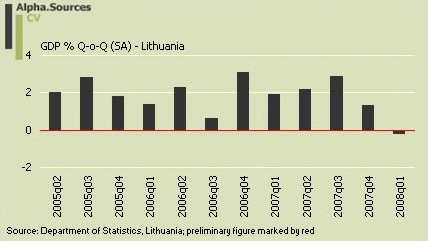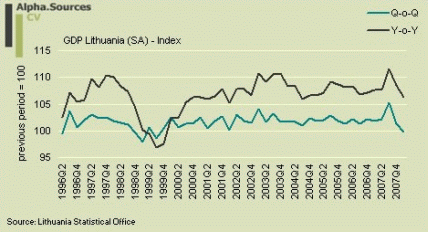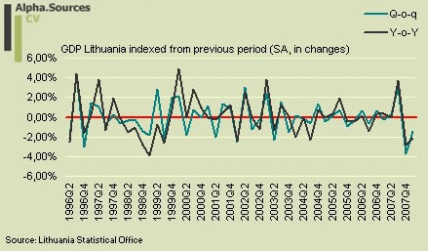Get the latest financial news, insights and expert analysis from our award-winning MoneyWeek team, to help you understand what really matters when it comes to your finances.
You are now subscribed
Your newsletter sign-up was successful
Want to add more newsletters?

Twice daily
MoneyWeek
Get the latest financial news, insights and expert analysis from our award-winning MoneyWeek team, to help you understand what really matters when it comes to your finances.

Four times a week
Look After My Bills
Sign up to our free money-saving newsletter, filled with the latest news and expert advice to help you find the best tips and deals for managing your bills. Start saving today!
As any mildly astute economist will know it is extremely difficult to call the exact turning point in an economic cycle and thus the point in time where a recession starts. Usually, such issues are resolved post mortem when the economic data has been firmly revised.
Moreover, the actual determination of a slowdown's or a recession's starting point also quickly turns into a battle royal between economists as the alphabet soup of different national account measures easily ties up the discussion as we end up comparing apples and pairs.
However, at this point in time I don't think we have the luxury to engage in such a battle among economic gentlemen. I don't think so because the Baltics' (and many of the other Eastern European countries') situation is a bit more complex than your average US type recession where a you clean up the mess with a couple of quarters of negative growth.
MoneyWeek
Subscribe to MoneyWeek today and get your first six magazine issues absolutely FREE

Sign up to Money Morning
Don't miss the latest investment and personal finances news, market analysis, plus money-saving tips with our free twice-daily newsletter
Don't miss the latest investment and personal finances news, market analysis, plus money-saving tips with our free twice-daily newsletter
What we consequently need to understand is that, depending on the turn of events and response from markets, the current slowdown may turn out to have quite far reaching consequences for the region. With these ominous remarks let us turn to the evidence suggesting that the tide is now finally turning in the Baltics.
In fact, we can only at this point say something decisive about Latvia and Lithuania since Estonia has not yet posted Q1 08 figures. The pace of growth however has been consistently lower in Estonia throughout 2007 compared to 2006 and in Q4 Estonia posted a growth rate of 0.9% q-o-q which is of course more than respectable but a significant slowdown in relative terms. What remains to be seen now is whether Estonia will kick off 2008 with negative growth rates or just eek out a positive showing.
Indicators for retail sales suggest that Estonia may be lagging Latvia so I would not be surprised if Estonian Q1 is positive on a q-o-q basis. In the context of Latvia my colleague Edward Hugh has been keeping a watchful eye. Back in March he asked the question of whether we were heading into a recession in Q4 2007? At the time, strong circumstantial suggested that this was the case and now with the recent flash estimate from Q1 it is safe to say the coffin has now been supplied the final nails;
'...in constant price terms - Latvian GDP hit a peak at some point between Q2 and Q3 2007 (lets say August 2007) and since that time has been steadily CONTRACTING. Now I know there are probably hundreds of different ways of skinning a chicken, and of course you can read data everywhichway you want to, and there are seasonal factors to take into account, but as far as I am concerned there is no getting away from it, on any reasonable criterion the Latvian economy is now in recession, and has been since the middle of last year.'
This leaves us with Lithuania. Since we just recently got Q1 2008 GDP figures (provisional estimates too) we should have a fairly strong picture of what is going on. First, we will have the visual inspection;



As can be observed in the figure above Lithuania stalled sharply from Q3 to Q4 and now posting a contraction in Q1 08 on a q-o-q basis. On a y-o-y basis the economy is still growing but this figure is basically pointless in so far as goes the determination of where the economy is at in the present time.
The first graph speaks for itself and in this context the two additional graphs plotting the indexed values of GDP do not really add much to the general picture. I still think they have merit though. Especially the last one is interesting as it shows the 'momentum' of the slowdown. Basically the chart shows the rate of expansion relative to the previous period without saying anything about the level of growth (which is shown in graph number two).
Baltic economies face a hard landing
I have been very cautious in pulling out the R-word in connection with the Baltics let alone Eastern European in general. I still am. However, what is clear at this point is that we are now observing a hard landing. The rate of the slowdown since it began in the middle of 2007 leaves no other conclusion I think.
What happens next then? This question is not at all insignificant. What we now have on our hands in the Baltics is, in macroeconomic terms, quite a predicament. Basically, the economic momentum now seems to be unwinding far too fast relative to the pace by which the inherent imbalances present in these economies can be expected to respond. Large external deficits and pegging currencies here are important since it means that the latter cannot adjust.
The only possible alternative if the rout continues is consequently a transition into price and wage deflation. It is still early to say whether this will materialize but it is now a real risk rather than a theoretical possibility.
Additionally, we now need to watch all those foreign banks who have set up shop across the Baltics helping to finance all those credit inflows. Will they stay or more specifically can they afford to? This is also now a question which must be considered as more than an academic question.
I am really sorry to start this week on such a nasty note but I do think that the genie is out of the bottle in the context of the Baltics. Now we need to watch carefully where it goes from here. If economic momentum (or lack thereof) continues to linger in the current territory we should be a prepared for a rapid change of fundamentals in the Baltics.
First published by Claus Vistesen on the Baltic Economy Watch blog, 12/05/08
Get the latest financial news, insights and expert analysis from our award-winning MoneyWeek team, to help you understand what really matters when it comes to your finances.
MoneyWeek is written by a team of experienced and award-winning journalists, plus expert columnists. As well as daily digital news and features, MoneyWeek also publishes a weekly magazine, covering investing and personal finance. From share tips, pensions, gold to practical investment tips - we provide a round-up to help you make money and keep it.
-
 Should you buy an active ETF?
Should you buy an active ETF?ETFs are often mischaracterised as passive products, but they can be a convenient way to add active management to your portfolio
-
 Power up your pension before 5 April – easy ways to save before the tax year end
Power up your pension before 5 April – easy ways to save before the tax year endWith the end of the tax year looming, pension savers currently have a window to review and maximise what’s going into their retirement funds – we look at how

